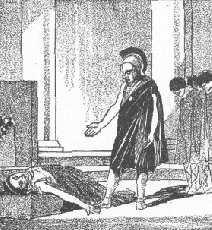|
 THE goddess Aphrodite, is much
incensed because Hippolytus, bastard son of King Theseus of Trozên
and the Amazon, Hippolyte, worships only pure Artemis. She resolves,
therefore, to bring about his death through the very sex that
he has scorned, and scorning, has thus offered insult to the
mighty Aphrodite. THE goddess Aphrodite, is much
incensed because Hippolytus, bastard son of King Theseus of Trozên
and the Amazon, Hippolyte, worships only pure Artemis. She resolves,
therefore, to bring about his death through the very sex that
he has scorned, and scorning, has thus offered insult to the
mighty Aphrodite.
For some months past, Phaedra, beloved wife of Theseus, has
hidden in her inmost heart a secret passion for the manly Hippolytus.
Through unsatiated desire and secret shame she has wasted away
until her old nurse despairs of her life. Finally, after much
coaxing, the old nurse learns her secret. On pretense of making
a love-philter that will cure Phaedra of her unholy love, the
nurse confesses her mistress' secret to Hippolytus. The latter
in anger scorns and upbraids Phaedra. Only his oath of secrecy
given to the nurse, he admits, keeps him from confessing his
step-mother's shame to the King as soon as His Majesty returns.
Phaedra, in her half-crazed state, scarcely heeds him. She
sees honor gone and her life ruined through her old servant's
mistaken kindness, for she really believes that Hippolytus means
to tell the King. In despair she hangs herself. Before the dread
deed, however, she has written on her tablet, sealed with a royal
seal, the charge that Hippolytus has dishonored her. On the King's
arrival the first thing he notes is the tablet fastened to his
dead wife's wrist. Grief-stricken, he opens it believing that
it will contain some final directions for the care of their children,
only to be shocked by the terrible accusation against Hippolytus.
The Prince's protestations of innocence are unavailing against
the King's unreasoning anger, and his oath prevents his speaking
the whole truth. Theseus condemns his son to life-long exile
and in addition prays to his ancestor, Poseidon, powerful god
of the sea, to destroy the ravisher of his dear wife.
Hippolytus, knowing the futility of further arguments, mounts
his chariot to drive along the seashore until he shall reach
his father's boundaries. As he drives, a terrible monster, riding
a huge wave, so affrights his spirited horses that he is dashed
against the rocks and is carried back, dying, to his father's
presence. While he is still conscious Artemis appears in a cloud
and explains to Theseus how cruelly Aphrodite had plotted against
Hippolytus. Thus both the youth and Phaedra are revealed as the
innocent victims of a goddess' jealousy and their honor is vindicated.
|

